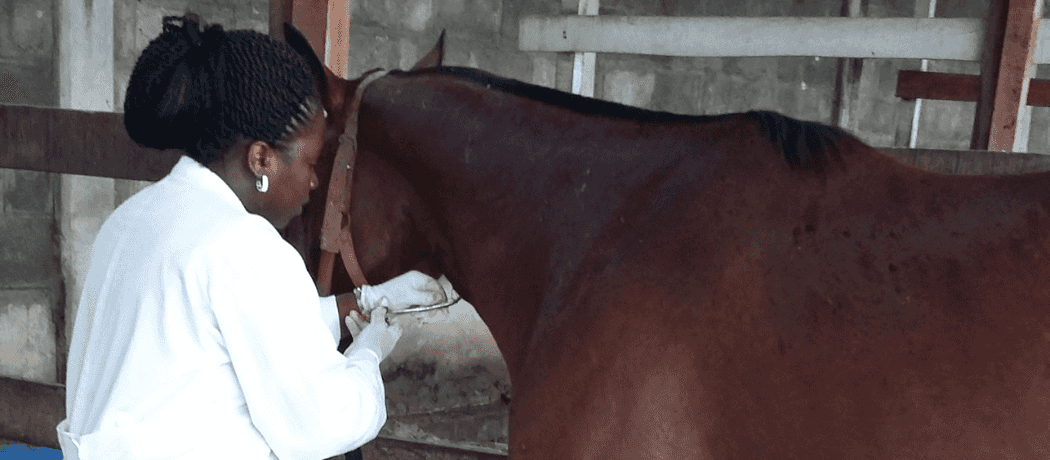
Bringing an International Perspective: Veterinarian-Turned-Grad-Student Dr. Afolakemi Adeniji Explores Global Disease Implications
June 07, 2023
Growing up in the small town of Ijebu-Ode in Ogun State, southwestern Nigeria, Dr. Afolakemi Adeniji (nee Dawodu) gained first-hand experience in agriculture. Her parents, now retired healthcare professionals, took pride in running the family hobby farm – passing on the family tradition to their three children. Raising animals and harvesting cassava became some of Adeniji’s fondest childhood memories, but at the time she wasn’t planning on becoming a veterinarian.

“My family loves farming as a hobby,” shares Adeniji. I grew up with dogs, goats, and backyard chickens, but I never thought I would become their doctor.”
When applying to university, Adeniji’s first choice was engineering, but given her excellent grades and program availability, she was accepted into the veterinary program at the Federal University of Agriculture (FUNAAB) in Abeokuta, Ogun State, Nigeria. She was hesitant about accepting the program offer, but after starting her first anatomy course, Adeniji realized how much she already knew about animal physiology and how much more she wanted to learn.
Adeniji graduated from FUNAAB at the top of her class and then began her career as a small animal veterinarian before turning her attention to equine medicine, working with horses at the Lagos Polo Club. Later, she went on to work as a public health veterinarian for the Ogun State Ministry of Agriculture.
After working as a veterinarian for almost a decade, Adeniji emigrated to Guelph to pursue a Master of Science (MSc) in Population Medicine at the Ontario Veterinary College (OVC). Her master’s program focuses on epidemiology with specialized training in applied clinical research.
Adeniji’s decision to pursue MSc specializing in epidemiology was strongly influenced by her work as a public health veterinarian.
“My job required surveillance and monitoring of animal diseases that are of public health importance and diagnosing and treating diseased animals to ensure that meat sold to people was wholesome and fit for consumption,” says Adeniji.
At OVC, Adeniji’s international experience offers valuable insights into the effects of infectious diseases on livestock.
“Kemi [Adeniji] has been a joy to co-supervise as she has a passion for zoonotic diseases, epidemiology, and food safety,” says Dr. Cathy Bauman, Associate Professor in the Department of Population Medicine. “She brings valuable veterinary experience from Nigeria and familiarity with foreign diseases - including those we have not seen here in Canada and are actively working to prevent them from entering (i.e. African swine fever (ASF), foot and mouth disease (FMD).”

response team during an avian
influenza outbreak in Nigeria
In a recent grant proposal, Adeniji suggested examining the efficacy of FMD vaccine on a breed of cattle and then using epidemiological tools to develop a risk assessment and monitoring plan.
“In Nigeria, FMD is an endemic disease, one that often wreaks havoc on local farmers,” she says. “The cost of caring for cattle is a struggle for many.”
The clinical research placement component of the MSc program will help Adeniji apply the skills she learned in class to real-world projects.
“The placement is meant to bridge the gap between schooling and work and to ensure students have relevant skills and opportunity to make connections for future employment,” said Bauman.
This summer, Adeniji’s placement with Animal Health Canada will give her hands-on experience working on projects that investigate the use of different intervention strategies to mitigate avian influenza (HPAI), ASF and FMD.

near Burlington, Ontario
When she manages to find a spare moment, Adeniji, who is also a mom to three young boys, likes to spend time with her family, teaching her children the family recipes and traditions she grew up with.
“In Nigeria, we have a farm where we plant and harvest cassava as a family,” reminisces Adeniji. “Here in Canada, I also have a farm. My husband and I rented a small plot of land where we grow corn and tomatoes. It’s just for fun, but growing our own food helps us stay close and our kids love it too.”
As for her plans for after graduation, Adeniji has many options.
“Parallel to my master’s degree, I am pursuing my Canadian veterinary certification. I love working with animals, but I also like the idea of contributing to disease management and prevention. My studies and my personal experiences have shown me that the health of animals, people, and the environment are all connected – which is the One Health approach. I am still figuring out the most meaningful way to make my contribution. “
The Ontario Veterinary College (OVC) at U of G is globally recognized for innovative research in One Health, Veterinary and Biomedical Sciences, and is committed to high-quality graduate training in basic and applied research.
.png)